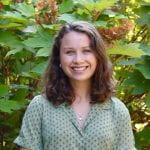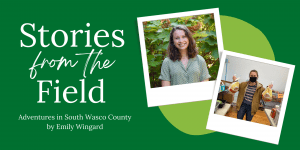By Emily Wingard, Capacity Building Manager, South Wasco Alliance
There is a sense of urgency present in the generations entering adulthood these past few years to explore and adventure, perhaps due to the awareness of impending doom a global pandemic and a climate crisis have instilled in them. The “unprecedented times” that started two years ago have become a new reality instead of fading into the distance, and there’s a startling earnestness to take advantage of opportunities as soon as they’re presented, in case they don’t last. I certainly felt that pull, and I thought moving 3,000 miles away from my home on the East Coast to rural Oregon was my opportunity to learn about myself and a new way of living while I still could. How different could the unincorporated town of Tygh Valley, OR be from my hometown of 31,000 in Connecticut? To the Oregonians reading this, I hear you scoffing at my ignorance. I have learned more than I could have thought possible in the few months I have lived here, but the biggest challenge by far has been acknowledging my inexperience and opening my mind enough to allow my new home to reshape my perceptions and beliefs about living and working rurally.
Quickly realizing upon arrival to my new home in Tygh Valley that rural Oregon was not the same as rural New England, I attempted to shapeshift into who I thought people wanted me to be. My first day of service saw me touring a 16,000-acre ranch not far from my office as part of a package being offered by my organization to participants in the Cycle Oregon event taking place that fall. Being new and nervous and desperate to impress, I pretended I had seen plenty of 16,000-acre ranches before. You have hundreds of cows? Oh yeah, me too.
Flash forward 30 minutes and my companions and I are stuck with one wheel of our truck dangling off a drop-off, a situation we got ourselves into when we attempted to turn around on a very narrow ridge after making a wrong turn driving to see an old pioneer woman’s grave. Just your average Monday morning, right? Feigning confidence, I offered to get out to push the truck from behind. I only really felt my anxiety spike when the rancher driving the truck replied with “Better hurry, we don’t want the exhaust to set the brush on fire.” It seems I had forgotten about Oregon’s stunning fire problem. With that realization, I felt my control over the situation quickly slip away. So much for playing it cool.
Not to skip the good part where I panicked and a Cycle Oregon member with actual confidence saved the day, but eventually, we turned the truck around without lighting the hill on fire or rolling over the edge. Thank goodness for small victories.
Despite the happy ending, my adventurous first day made me realize how little I knew about this environment and the people that lived in it. How was I to develop programs to support a community I didn’t understand? The answer was simple, but it required me to set aside any preconceived notions I had about how I fit into my new surroundings. My job–instead of subjecting South Wasco County to development they did not ask for and imposing my personal goals on my neighbors–was to focus on building relationships.
The answer to developing programs for a community I had yet to understand was taking the time to integrate; adopting the role of inquirer instead of commander, as I had always been accustomed to doing. My most important role has become functioning as a bridge between the voices of this rural community and the resources I am able to access through my position as a RARE. The organization I have been fortunate enough to work for, South Wasco Alliance (SWA), was built to function as a middle ground between rural communities and urban resources. With a small organization working to accommodate all of South Wasco County and span such a gap, it can be difficult to cover all the necessary ground. I’ve found my place in filling those spaces, measuring where there is energy in the community, and putting myself at the disposal of community leaders to make their ideas come to life.
One such idea was for a Saturday market in Tygh Valley. The idea began as a post on a local Facebook page and has now turned into an official community meeting supported by grant money acquired by SWA. A Raised Garden Bed Program implemented at the local Head Start School in Tygh Valley has expanded to include Head Start students on the Warm Springs Reservation through SWA board member connections. The talent, drive, and dedication needed to make positive change has always been a part of South Wasco County. Witnessing the energy first hand, being able to partake in bringing people together to facilitate cooperation, and supporting progress to create a community that people take pride in has been a truly invigorating experience.
As I work with the SWA team to lift the Farmers Market project and other community efforts off the ground, I look forward to watching this community grow as a unit and exemplify to the rest of Oregon how accomplished and promising South Wasco County truly is.
 About the author, Emily Wingard: Emily grew up in Connecticut and graduated from the University of Vermont in 2021 with a dual degree in Political Science and Psychology. Emily is passionate about social justice and community building, and has always been energized by working with people. Through classes in psychology and an internship with the Head Start program in college, Emily found that channeling opportunities to individuals to help them develop the skills and confidence they need to achieve their goals is inspiring, and it’s led her to pursue work with nonprofits and rural environments here in Oregon. As someone with a love for nature and whose hobbies are somewhat dependent on access to the outdoors, Emily has fallen in love with Oregon’s scenery and abundance of outdoor recreation, and she is excited to learn more about what this great state has to offer.
About the author, Emily Wingard: Emily grew up in Connecticut and graduated from the University of Vermont in 2021 with a dual degree in Political Science and Psychology. Emily is passionate about social justice and community building, and has always been energized by working with people. Through classes in psychology and an internship with the Head Start program in college, Emily found that channeling opportunities to individuals to help them develop the skills and confidence they need to achieve their goals is inspiring, and it’s led her to pursue work with nonprofits and rural environments here in Oregon. As someone with a love for nature and whose hobbies are somewhat dependent on access to the outdoors, Emily has fallen in love with Oregon’s scenery and abundance of outdoor recreation, and she is excited to learn more about what this great state has to offer.
Interested in gaining food systems experience of your own? Are you looking for a life changing experience in rural Oregon? Learn more about serving with the RARE AmeriCorps Program. Applications for Year 29 (2022-23) due April 25, 2022 by 5pm PDT.

